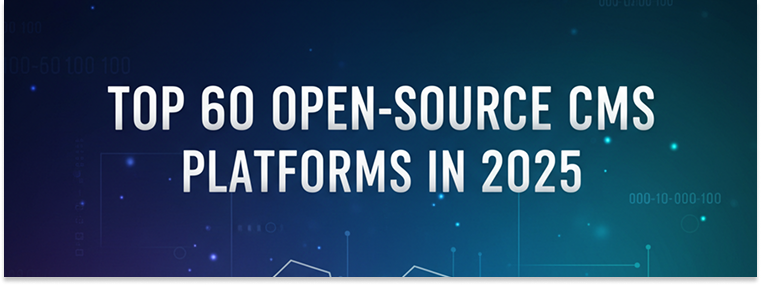If you’re looking to build your next big project, choosing the right Content Management System (CMS) can make all the difference. In the UK and worldwide, open-source CMS platforms are booming, offering developers and businesses flexibility, scalability, and complete control over their websites and applications.
Here’s a list of 60 open-source CMS platforms (2025), covering PHP, Python, Java, Node.js, Ruby, .NET, and static site generators.
🟢 PHP-based CMS
- WordPress – The world’s most popular CMS with a huge ecosystem.
- Drupal – Powerful, secure, and enterprise-ready.
- Joomla! – Flexible and community-driven CMS.
- OctoberCMS – Laravel-based CMS, developer-friendly.
- Backdrop CMS – Lightweight fork of Drupal 7.
- Grav – Flat-file CMS, blazing fast.
- Bolt CMS – Content-first modern CMS.
- Concrete5 – Drag-and-drop website builder.
- TYPO3 – Enterprise-class CMS, widely used in Europe.
- ModX – Flexible PHP CMS and application framework.
- ProcessWire – API-first CMS with high flexibility.
- Fork CMS – Easy-to-use CMS with marketing tools.
- Sulu CMS – Symfony-based enterprise CMS.
- Pimcore – Digital experience platform & PIM.
- Directus – Headless CMS with REST & GraphQL APIs.
- Pagekit CMS – Lightweight, modern PHP CMS.
- Microweber – Drag-and-drop CMS and shop system.
- Anchor CMS – Minimalist blogging CMS.
- Serendipity – Blogging-focused CMS.
- e107 – Community-driven open-source CMS.
🟠 Python-based CMS
- Django CMS – Enterprise-level CMS built on Django.
- Wagtail – Modern Django CMS (popular in the UK, used by NHS & Google).
- Mezzanine – Simple, flexible Django CMS.
- Plone – Extremely secure enterprise CMS.
- Kotti CMS – Lightweight CMS on Pyramid framework.
- FeinCMS – Minimal, extensible Django CMS.
- Quokka CMS – Flask-based CMS, API-friendly.
- Opps CMS – Scalable Django CMS for media portals.
🔵 Java-based CMS
- Magnolia CMS – Enterprise, API-first CMS.
- dotCMS – Hybrid Java-based content management.
- OpenCMS – Robust enterprise web CMS.
- Alfresco – Open-source enterprise content management.
- Hippo CMS (Bloomreach) – Now commercial, but open-source roots.
- Liferay – Enterprise portal + CMS.
- OpenWGA – Java CMS with collaboration features.
- CrafterCMS – Modern headless Java CMS.
🟣 Node.js-based CMS
- Ghost – Modern publishing platform & headless CMS.
- Strapi – API-first headless CMS, great for React/Next.js.
- KeystoneJS – GraphQL-powered Node.js CMS.
- ApostropheCMS – Drag-and-drop Node.js CMS.
- Payload CMS – New-generation Node.js & TypeScript headless CMS.
- Reaction Commerce – Headless eCommerce platform.
- Netlify CMS – Git-based CMS for Jamstack.
- FactorJS – Vue + Node.js CMS.
- Calypso – WordPress.com front-end built with React/Node.js.
🔴 Ruby / Rails CMS
- RefineryCMS – Simple, extendable Rails CMS.
- Radiant CMS – Lightweight Rails CMS.
- Alchemy CMS – Flexible content-focused Rails CMS.
- Publify – Blogging platform built with Ruby.
🟣 .NET & Other CMS
- Orchard Core – Modular .NET Core CMS.
- Umbraco CMS – Popular .NET CMS (huge in the UK).
- Piranha CMS – Lightweight .NET Core CMS.
- MojoPortal – Open-source .NET CMS.
🟡 Static Site Generators & Headless CMS
- Jekyll – Ruby-based static site generator.
- Hugo – Extremely fast Go-based static site generator.
- Hexo – Node.js-powered blog framework.
- VuePress – Vue.js-based documentation CMS.
- Docusaurus – React-based static docs CMS.
- Publii – Desktop CMS for static websites.
- Eleventy (11ty) – Simple, flexible static site generator.
